2008年高考英语试卷听力+原文+答案(全国卷Ⅰ、Ⅱ)
高考英语听力真题及答案解析全国1卷
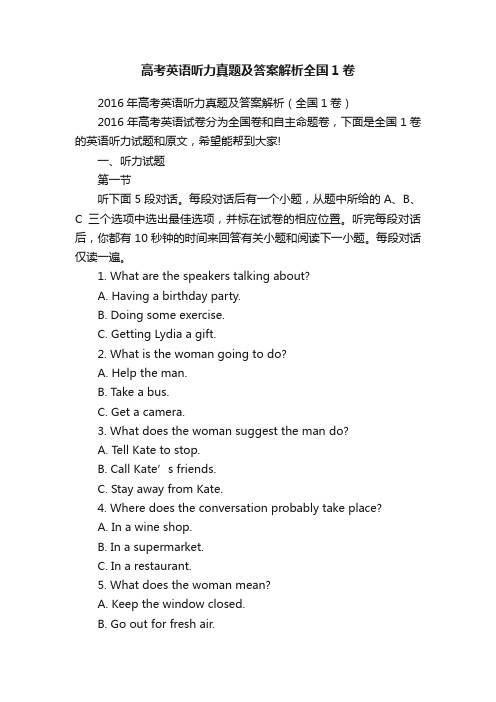
高考英语听力真题及答案解析全国1卷2016年高考英语听力真题及答案解析(全国1卷)2016年高考英语试卷分为全国卷和自主命题卷,下面是全国1卷的英语听力试题和原文,希望能帮到大家!一、听力试题第一节听下面5段对话。
每段对话后有一个小题,从题中所给的A、B、C三个选项中选出最佳选项,并标在试卷的相应位置。
听完每段对话后,你都有10秒钟的时间来回答有关小题和阅读下一小题。
每段对话仅读一遍。
1. What are the speakers talking about?A. Having a birthday party.B. Doing some exercise.C. Getting Lydia a gift.2. What is the woman going to do?A. Help the man.B. Take a bus.C. Get a camera.3. What does the woman suggest the man do?A. Tell Kate to stop.B. Call Kate’s friends.C. Stay away from Kate.4. Where does the conversation probably take place?A. In a wine shop.B. In a supermarket.C. In a restaurant.5. What does the woman mean?A. Keep the window closed.B. Go out for fresh air.C. Turn on the fan.第二节听下面5段对话或独白。
每段对话或独白后有几个小题,从题中所给的A、B、C三个选项中选出最佳选项,并标在试卷的相应位置。
听每段对话或独白前,你将有时间阅读各个小题,每小题5秒钟;听完后,各小题将给出5秒钟的作答时间。
每段对话或独白读两遍。
全国卷高考英语听力原文试题参考答案
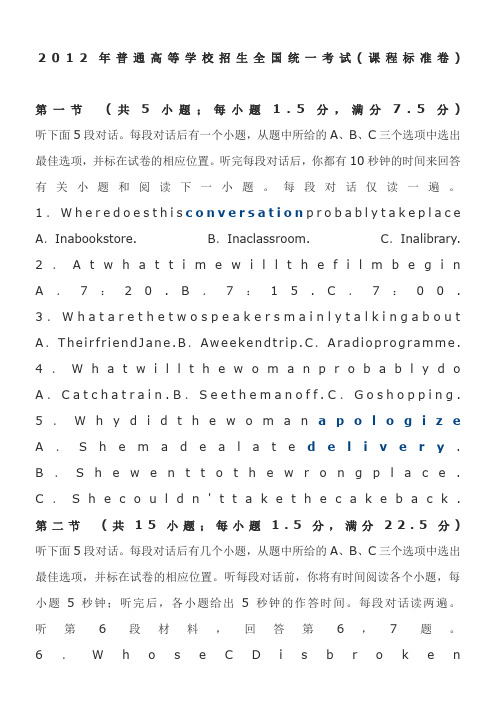
2012年普通高等学校招生全国统一考试(课程标准卷)第一节(共5小题;每小题1.5分,满分7.5分)听下面5段对话。
每段对话后有一个小题,从题中所给的A、B、C三个选项中选出最佳选项,并标在试卷的相应位置。
听完每段对话后,你都有10秒钟的时间来回答有关小题和阅读下一小题。
每段对话仅读一遍。
1.W h e r e d o e s t h i s c o n v e r s a t i o n p r o b a b l y t a k e p l a c e A.Inabookstore.B.Inaclassroom.C.Inalibrary. 2.A t w h a t t i m e w i l l t h e f i l m b e g i n A.7:20.B.7:15.C.7:00. 3.W h a t a r e t h e t w o s p e a k e r s m a i n l y t a l k i n g a b o u t A.T h e i r f r i e n d J a n e.B.Aw e e ke n d t r i p.C.A ra d i o p r o g ra m m e. 4.W h a t w i l l t h e w o m a n p r o b a b l y d o A.C a t c h a t r a i n.B.S e e t h e m a n o f f.C.G o s h o p p i n g. 5.W h y d i d t h e w o m a n a p o l o g i z e A.S h e m a d e a l a t e d e l i v e r y. B.S h e w e n t t o t h e w r o n g p l a c e. C.S h e c o u l d n't t a k e t h e c a k e b a c k.第二节(共15小题;每小题1.5分,满分22.5分)听下面5段对话。
52015年全国高考英语试卷听力+原文+答案(新课标Ⅰ、Ⅱ)
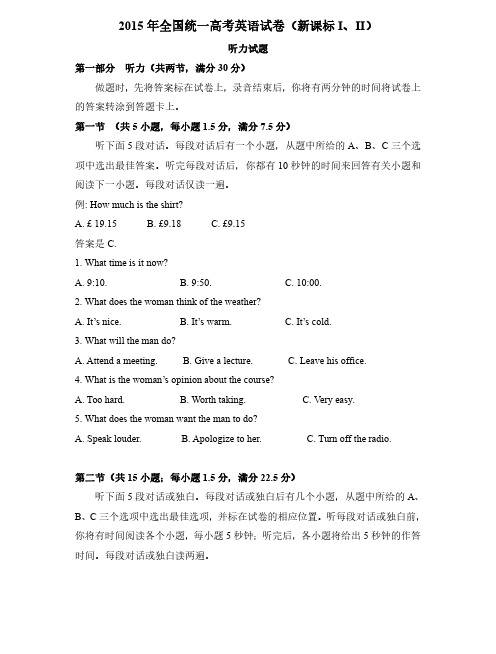
2015年全国统一高考英语试卷(新课标I、Ⅱ)听力试题第一部分听力(共两节,满分30分)做题时,先将答案标在试卷上,录音结束后,你将有两分钟的时间将试卷上的答案转涂到答题卡上。
第一节(共5小题,每小题1.5分,满分7.5分)听下面5段对话。
每段对话后有一个小题,从题中所给的A、B、C三个选项中选出最佳答案。
听完每段对话后,你都有10秒钟的时间来回答有关小题和阅读下一小题。
每段对话仅读一遍。
例:How much is the shirt?A.£19.15B.£9.18C.£9.15答案是C.1.What time is it now?A.9:10.B.9:50.C.10:00.2.What does the woman think of the weather?A.It’s nice.B.It’s warm.C.It’s cold.3.What will the man do?A.Attend a meeting.B.Give a lecture.C.Leave his office.4.What is the woman’s opinion about the course?A.Too hard.B.Worth taking.C.Very easy.5.What does the woman want the man to do?A.Speak louder.B.Apologize to her.C.Turn off the radio.第二节(共15小题;每小题1.5分,满分22.5分)听下面5段对话或独白。
每段对话或独白后有几个小题,从题中所给的A、B、C三个选项中选出最佳选项,并标在试卷的相应位置。
听每段对话或独白前,你将有时间阅读各个小题,每小题5秒钟;听完后,各小题将给出5秒钟的作答时间。
每段对话或独白读两遍。
听第6段材料,回答第6、7题。
6.How long did Michael stay in China?A.Five days.B.One week.C.Two weeks.7.Where did Michael go last year?A.Russia.B.Norway.C.India.听第7段材料,回答第8、9题。
08高考英语全国卷1含答案

2008全国卷1第二部分听力(共两节,满分30分)21.—Would you like to join me for-a quiek leach before class?—,but Ipromised Nancy to go out with her.A.I‟d like toB.Ilike itC.I will22. —What fruit is in season now?—Pears and apples,.A.I knowB.I thinkC.I seeD.I feel23.The perfommanee nearly three hours, but few pcople left the thear early.A.coveredB.reachedC.playedsted24.Let‟s leem to use the problem we are facing a stepping-stone to future success.A.toB.forC.asD.by25.The lawyer seldom wears anything other than a suit the season.A.whateverB.whereverC.wheneverD.however26.I like gening up ven early in snmmcc The moming arr is so good .A.to be breathedB.to breatheC.brd thningD.being breathed27. —Have you known Dr Jackson for a long time?—Yes, since she the Chinese Society.A.has joinedB.joinsC.had joindeD.joined28.You‟re driving too fast.Can you drive ?A.more slowly a biuB.slowly a bit moreC.a bit more slowlyD.slowly more bit29.The wet weather will continat tomon ow when a cold front to amve.A.is espectedB.is expectingC.cxp ctsD.will be expccted30. —Which of the two computer two computer games did you prefer?A.both of themB.either of themC.none of themD.neither of them31. —Have you got any idea for the summer vacation?—I don‟t rrmtnd where we ge there‟s sun sea and beach.A.as irB.as long asC.now thatD.m crdcr32.The weather was cold that I didn‟t like to leave my room.A.reallyB.suchC.tooD.so33.The English spoken in the United States is only slightly different from spoken in EnglandA.whichB.whatC.thatD.the one34.After studying in a medicat college for five years, Jane her job as a donat in the countryside.A.set ouB.took overC.took upD.set up35. —Sorry,I made a mistake again.—.Practice more and you … II succeed.A.Never mindB.CertainlyC.Not at allD.Don‟t mention it完形填空(共20小题:每小题1.5,满分30分)阅读下面短文,从短文后各题所给的四个选项(A、B、C和D)出可以填入空白的最佳选项,并在答题卡上将该项涂黑。
2014年高考英语全国卷1-答案

2014年普通高等学校招生全国统一考试(全国新课标卷1)英语答案解析第Ⅰ卷第一部分听力第一节1.【答案】A【解析】由对话中女士说“This is the address. How do I find it?”可知女士想找个地方,故选A2.【答案】B【解析】由对话中男士说“I can drop you off on my way.”可知,男士将送女士一程,故选B.3.【答案】C【解析】由对话中男士说今天早上已经叫了各部门负责人到他办公室,他们需要向Mr. Peterson汇报工作。
由此可知,Mr. Peterson 是公司负责人,故选C.4.【答案】B【解析】由对话中男士说“…once I started I simply couldn’t put it down”可知男士认为书很有趣,故选B 5.【答案】A【解析】由对话中女士说都已经五月份了,还得穿御寒的衣服,男士说收音机广播了好消息,说不定从明天起女士就可以穿短裤了呢。
由此可知,谈话者在谈论天气,故选A.6.【答案】B【解析】由男士说“You know there is a basketball match on TV today. Let’s just stay home and watch it.”可知男士想要看电视,所以拒绝加入女士,故选B.7.【答案】C【解析】女士邀请男士一起打乒乓球,男士不想参加,女士最后说她和海伦一起打。
由此可知,女士接下来会做运动,故选C.8.【答案】A【解析】由“I should be home from work at 5:45.”,故选A.9.【答案】C【解析】女士说也许UME电影院七点的电影更好,Jacky Chan 主演的,男士说可以。
由此可知,谈话者要去UME电影院,故选C.10.【答案】A【解析】由“So we're leaving on Monday from Hartsfield International Airport…”可知答案.故选C.11.【答案】A【解析】对话中女士说公司安排了车送他们到机场,并且公司负责这次旅行的费用。
2009年高考英语试卷听力+原文+答案(全国卷Ⅰ、Ⅱ)

2009年全国统一高考英语试卷(全国卷I)听力试题第一部分听力(共两节,满分30分)做题时,先将答案标在试卷上,录音结束后,你将有两分钟的时间将试卷上的答案转涂到答题卡上。
第一节(共5小题,每小题1.5分,满分7.5分)听下面5段对话。
每段对话后有一个小题,从题中所给的A、B、C三个选项中选出最佳答案。
听完每段对话后,你都有10秒钟的时间来回答有关小题和阅读下一小题。
每段对话仅读一遍。
例: How much is the shirt?A. £ 19.15.B. £9.18.C. £9.15.答案是C.1. What do the speakers need to buy?A. A fridge.B. A dinner table.C. A few chairs.2. Where are the speakers?A. In a restaurant.B. In a hotel.C. In a school.3. What does the woman mean?A. Cathy will be at the party.B. Cathy is too busy to come.C. Cathy is going to be invited.4. Why does the woman plan to go to town?A. To pay her bills in the bank.B. To buy books in a bookstore.C. To get some money from the bank.5. What is the woman trying to do?A. Finish some writing.B. Print an article.C. Find a newspaper.第二节(共15小题,每小题1.5分,满分22.5分)听下面5段对话或独白。
2008年高考英语听力原文及答案(全国卷)
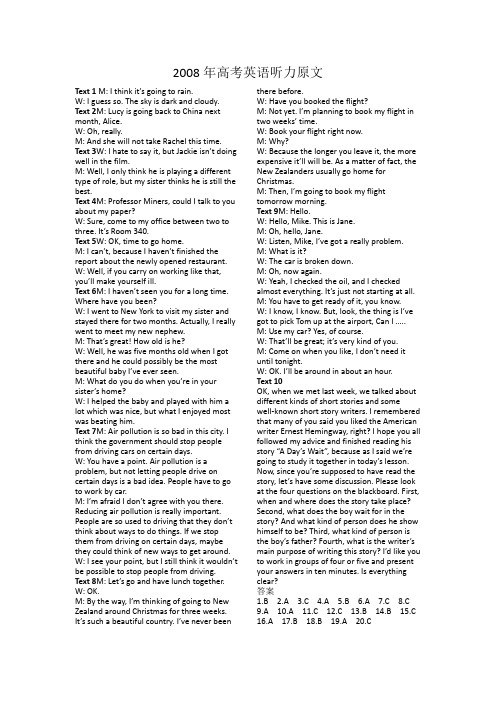
2008年高考英语听力原文Text 1 M: I think it’s going to rain.W: I guess so. The sky is dark and cloudy. Text 2M: Lucy is going back to China next month, Alice.W: Oh, really.M: And she will not take Rachel this time. Text 3W: I hate to say it, but Jackie isn’t do ing well in the film.M: Well, I only think he is playing a different type of role, but my sister thinks he is still the best.Text 4M: Professor Miners, could I talk to you about my paper?W: Sure, come to my office between two to three. It’s Room 340.Text 5W: OK, time to go home.M: I can’t, because I haven’t finished the report about the newly opened restaurant. W: Well, if you carry on working like that, you’ll make yourself ill.Text 6M: I haven’t seen you for a long time. Where have you been?W: I went to New York to visit my sister and stayed there for two months. Actually, I really went to meet my new nephew.M: That’s great! How old is he?W: Well, he was five months old when I got there and he could possibly be the most beautiful baby I’ve ever se en.M: What do you do when you’re in your sister’s home?W: I helped the baby and played with him a lot which was nice, but what I enjoyed most was beating him.Text 7M: Air pollution is so bad in this city. I think the government should stop people from driving cars on certain days.W: You have a point. Air pollution is a problem, but not letting people drive on certain days is a bad idea. People have to go to work by car.M: I’m afraid I don’t agree with you there. Reducing air pollution is really important. People are so used to driving that they don’t think about ways to do things. If we stop them from driving on certain days, maybe they could think of new ways to get around. W: I see your point, but I still think it wouldn’t be possible to stop people from driving. Text 8M: Let’s go and have lunch together. W: OK.M: By the way, I’m thinking of going to New Zealand around Christmas for three weeks. It’s such a beautiful country. I’ve never been there before.W: Have you booked the flight?M: Not yet. I’m planning to book my flight in two weeks’ time.W: Book your flight right now.M: Why?W: Because the longer you leave it, the more expensive it’ll will be. As a matter of fact, the New Zealanders usually go home for Christmas.M: Then, I’m going to book my flight tomorrow morning.Text 9M: Hello.W: Hello, Mike. This is Jane.M: Oh, hello, Jane.W: Listen, Mike, I’ve got a really problem. M: What is it?W: The car is broken down.M: Oh, now again.W: Yeah, I checked the oil, and I checked almost everythin g. It’s just not starting at all. M: You have to get ready of it, you know. W: I know, I know. But, look, the thing is I’ve got to pick Tom up at the airport, Can I ….. M: Use my car? Yes, of course.W: That’ll be great; it’s very kind of you.M: Come on w hen you like, I don’t need it until tonight.W: OK. I’ll be around in about an hour.Text 10OK, when we met last week, we talked about different kinds of short stories and somewell-known short story writers. I remembered that many of you said you liked the American writer Ernest Hemingway, right? I hope you all followed my advice and finished reading his story “A Day’s Wait”, because as I said we’re going to study it together in today’s lesson. Now, since you’re supposed to have read the story, let’s have some discussion. Please look at the four questions on the blackboard. First, when and where does the story take place? Second, what does the boy wait for in the story? And what kind of person does he show himself to be? Third, what kind of person is the b oy’s father? Fourth, what is the writer’s main purpose of writing this story? I’d like you to work in groups of four or five and present your answers in ten minutes. Is everything clear?答案1.B2.A3.C4.A5.B6.A7.C8.C9.A 10.A 11.C 12.C 13.B 14.B 15.C 16.A 17.B 18.B 19.A 20.C。
2008年全国统一高考英语试卷(全国卷ii)(含部分解析)
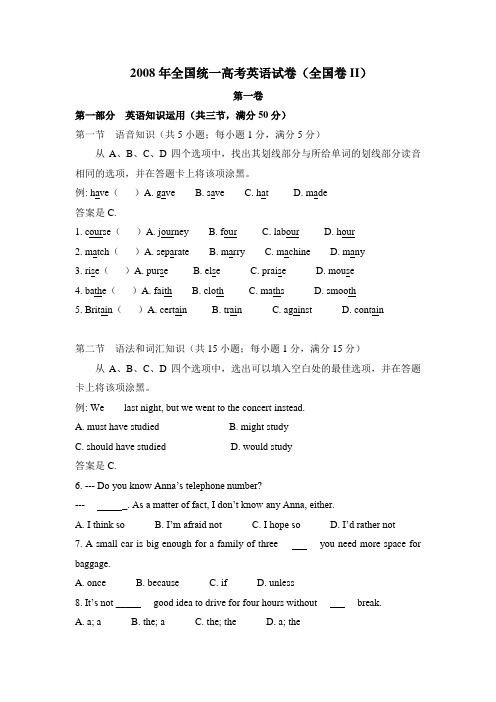
2008年全国统一高考英语试卷(全国卷II)第一卷第一部分英语知识运用(共三节,满分50分)第一节语音知识(共5小题;每小题1分,满分5分)从A、B、C、D四个选项中,找出其划线部分与所给单词的划线部分读音相同的选项,并在答题卡上将该项涂黑。
例: have()A. gave B. save C. hat D. made答案是C.1. course()A. journey B. four C. labour D. hour2. match()A. separate B. marry C. machine D. many3. rise()A. purse B. else C. praise D. mouse4. bathe()A. faith B. cloth C. maths D. smooth5. Britain()A. certain B. train C. against D. contain第二节语法和词汇知识(共15小题;每小题1分,满分15分)从A、B、C、D四个选项中,选出可以填入空白处的最佳选项,并在答题卡上将该项涂黑。
例: We ___ last night, but we went to the concert instead.A. must have studiedB. might studyC. should have studiedD. would study答案是C.6. --- Do you know An na’s telephone number?--- ___ _. As a matter of fact, I don’t know any Anna, either.A. I think soB. I’m afraid notC. I hope soD. I’d rather not7. A small car is big enough for a family of three __ __ you need more space for baggage.A. onceB. becauseC. ifD. unless8. It’s not ____ good idea to drive for four hours without __ __ break.A. a; aB. the; aC. the; theD. a; the9. --- What are you reading, Tom?--- I’m not really reading, just ____ the pages.A. turning offB. turning aroundC. turning overD. turning up10. --- Could I ask you a rather personal question?--- Sure, ____.A. pardon meB. go aheadC. good ideaD. forget it11. If the weather had been better, we could have had a picnic. But it ____ all day.A. rainedB. rainsC. has rainedD. is raining12. The director had her assistant ___ some hot dogs for the meeting.A. picked upB. picks upC. pick upD. picking up13. Stand over there ___ you’ll be able to see the oil painting better.A. butB. tillC. andD. or14. If their marketing plans succeed, they ____ their sales by 20 percent.A. will increaseB. have been increasingC. have increasedD. would be increasing15. Modern equipment and no smoking are two of the things I like ____ working here.A. withB. overC. atD. about16. The road conditions there turned out to be very good, ___ was more than we could expect.A. itB. whatC. whichD. that17. Liza ___ well not want to go on the trip --- she hates traveling.A. willB. canC. mustD. may18. Little Johnny felt the bag, curious to know what it ____.A. collectedB. containedC. loadedD. saved19. The house still needed a lot of work, but ___ the kitchen was finished.A. insteadB. altogetherC. at onceD. at least20. It was in New Zealand ___ Elizabeth first met Mr. Smith.A. thatB. howC. whichD. when第三节完形填空(共20小题;每小题1.5分,满分30分)阅读下面短文,从短文后各题所给的四个选项(A、B、C和D)中,选出可以填入空白处的最佳选项,并在答题卡上将该选项涂黑。
2024年高考英语新课标全国Ⅱ卷+答案详解(含听力)
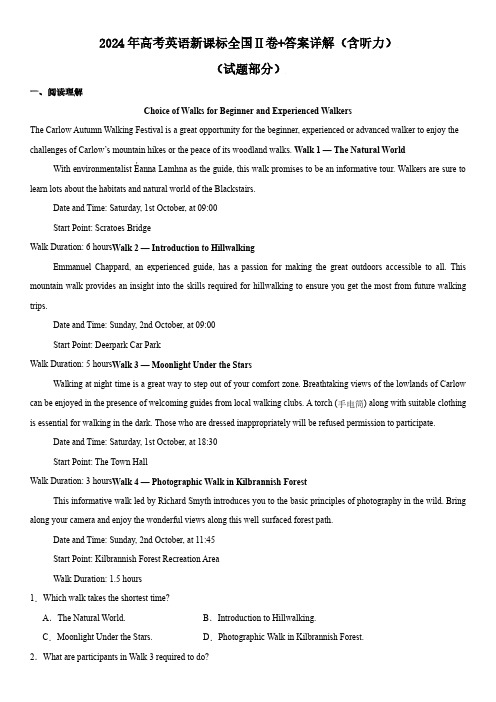
2024年高考英语新课标全国Ⅱ卷+答案详解(含听力)(试题部分)一、阅读理解Choice of Walks for Beginner and Experienced WalkersThe Carlow Autumn Walking Festival is a great opportunity for the beginner, experienced or advanced walker to enjoy the challenges of Carlow’s mountain hikes or the peace of its woodland walks. Walk 1 — The Natural World With environmentalist Éanna Lamhna as the guide, this walk promises to be an informative tour. Walkers are sure to learn lots about the habitats and natural world of the Blackstairs.Date and Time: Saturday, 1st October, at 09:00Start Point: Scratoes BridgeWalk Duration: 6 hours Walk 2 — Introduction to HillwalkingEmmanuel Chappard, an experienced guide, has a passion for making the great outdoors accessible to all. This mountain walk provides an insight into the skills required for hillwalking to ensure you get the most from future walking trips.Date and Time: Sunday, 2nd October, at 09:00Start Point: Deerpark Car ParkWalk Duration: 5 hours Walk 3 — Moonlight Under the StarsWalking at night-time is a great way to step out of your comfort zone. Breathtaking views of the lowlands of Carlow can be enjoyed in the presence of welcoming guides from local walking clubs. A torch (手电筒) along with suitable clothing is essential for walking in the dark. Those who are dressed inappropriately will be refused permission to participate.Date and Time: Saturday, 1st October, at 18:30Start Point: The Town HallWalk Duration: 3 hours Walk 4 — Photographic Walk in Kilbrannish ForestThis informative walk led by Richard Smyth introduces you to the basic principles of photography in the wild. Bring along your camera and enjoy the wonderful views along this well-surfaced forest path.Date and Time: Sunday, 2nd October, at 11:45Start Point: Kilbrannish Forest Recreation AreaWalk Duration: 1.5 hours1.Which walk takes the shortest time?A.The Natural World.B.Introduction to Hillwalking.C.Moonlight Under the Stars.D.Photographic Walk in Kilbrannish Forest.2.What are participants in Walk 3 required to do?A.Wear proper clothes.B.Join a walking club.C.Get special permits.D.Bring a survival guide.3.What do the four walks have in common?A.They involve difficult climbing.B.They are for experienced walkers.C.They share the same start point.D.They are scheduled for the weekend.Do you ever get to the train station and realize you forgot to bring something to read? Yes, we all have our phones, but many of us still like to go old school and read something printed.Well, there’s a kiosk (小亭) for that. In the San Francisco Bay Area, at least.“You enter the fare gates (检票口) and you’ll see a kiosk that is lit up and it tells you can get a one-minute, a three-minute, or a five-minute story,” says Alicia Trost, the chief communications officer for the San Francisco Bay Area Rapid Transit — known as BART. “You choose which length you want and it gives you a receipt-like short story.”It’s that simple. Riders have printed nearly 20,000 short stories and poems since the program was launched last March. Some are classic short stories, and some are new original works.Trost also wants to introduce local writers to local riders. “We wanted to do something where we do a call to artists in the Bay Area to submit stories for a contest,” Trost says. “And as of right now, we’ve received about 120 submissions. The winning stories would go into our kiosk and then you would be a published artist.”Ridership on transit (交通) systems across the country has been down the past half century, so could short stories save transit?Trost thinks so.“At the end of the day all transit agencies right now are doing everything they can to improve the rider experience. So I absolutely think we will get more riders just because of short stories,” she says.And you’ll never be without something to read.4.Why did BART start the kiosk program?A.To promote the local culture.B.To discourage phone use.C.To meet passengers’ needs.D.To reduce its running costs.5.How are the stories categorized in the kiosk?A.By popularity.B.By length.C.By theme.D.By language.6.What has Trost been doing recently?A.Organizing a story contest.B.Doing a survey of customers.C.Choosing a print publisher.D.Conducting interviews with artists.7.What is Trost’s opinion about BART’s future?A.It will close down.B.Its profits will decline.C.It will expand nationwide.D.Its ridership will increase.We all know fresh is best when it comes to food. However, most produce at the store went through weeks of travel and covered hundreds of miles before reaching the table. While farmer’s markets are a solid choice to reduce the journey, Babylon Micro-Farm (BMF) shortens it even more.BMF is an indoor garden system. It can be set up for a family. Additionally, it could serve a larger audience such as a hospital, restaurant or school. The innovative design requires little effort to achieve a reliable weekly supply of fresh greens.Specifically, it’s a farm that relies on new technology. By connecting through the Cloud, BMF is remotely monitored. Also, there is a convenient app that provides growing data in real time. Because the system is automated, it significantly reduces the amount of water needed to grow plants. Rather than watering rows of soil, the system provides just the right amount to each plant. After harvest, users simply replace the plants with a new pre-seeded pod (容器) to get the next growth cycle started.Moreover, having a system in the same building where it’s eaten means zero emissions (排放) from transporting plants from soil to salad. In addition, there’s no need for pesticides and other chemicals that pollute traditional farms and the surrounding environment.BMF employees live out sustainability in their everyday lives. About half of them walk or bike to work. Inside the office, they encourage recycling and waste reduction by limiting garbage cans and avoiding single-use plastic. “We are passionate about reducing waste, carbon and chemicals in our environment,” said a BMF employee.8.What can be learned about BMF from paragraph 1?A.It guarantees the variety of food.B.It requires day-to-day care.C.It cuts the farm-to-table distance.D.It relies on farmer’s markets.9.What information does the convenient app offer?A.Real-time weather changes.B.Current condition of the plants.C.Chemical pollutants in the soil.D.Availability of pre-seeded pods.10.What can be concluded about BMF employees?A.They have a great passion for sports.B.They are devoted to community service.C.They are fond of sharing daily experiences.D.They have a strong environmental awareness.11.What does the text mainly talk about?A.BMF’s major strengths.B.BMF’s general management.C.BMF’s global influence.D.BMF’s technical standards.Given the astonishing potential of AI to transform our lives, we all need to take action to deal with our AI-powered future, and this is where AI by Design: A Plan for Living with Artificial Intelligence comes in. This absorbing new book byCatriona Campbell is a practical roadmap addressing the challenges posed by the forthcoming AI revolution (变革).In the wrong hands, such a book could prove as complicated to process as the computer code (代码) that powers AI but, thankfully, Campbell has more than two decades’ professional experience translating the heady into the understandable. She writes from the practical angle of a business person rather than as an academic, making for a guide which is highly accessible and informative and which, by the close, will make you feel almost as smart as AI.As we soon come to learn from AI by Design, AI is already super-smart and will become more capable, moving from the current generation of “narrow-AI” to Artificial General Intelligence. From there, Campbell says, will come Artificial Dominant Intelligence. This is why Campbell has set out to raise awareness of AI and its future now-several decades before these developments are expected to take place. She says it is essential that we keep control of artificial intelligence, or risk being sidelined and perhaps even worse.Campbell’s point is to wake up those responsible for AI-the technology companies and world leaders-so they are on the same page as all the experts currently developing it. She explains we are at a “tipping point” in history and must act now to prevent an extinction-level event for humanity. We need to consider how we want our future with Al to pan out. Such structured thinking, followed by global regulation, will enable us to achieve greatness rather than our downfall.AI will affect us all, and if you only read one book on the subject, this is it.12.What does the phrase “In the wrong hands” in paragraph 2 probably mean?A.If read by someone poorly educated.B.If reviewed by someone ill-intentioned.C.If written by someone less competent.D.If translated by someone unacademic.13.What is a feature of AI by Design according to the text?A.It is packed with complex codes.B.It adopts a down-to-earth writing style.C.It provides step-by-step instructions.D.It is intended for AI professionals.14.What does Campbell urge people to do regarding AI development?A.Observe existing regulations on it.B.Reconsider expert opinions about it.C.Make joint efforts to keep it under control.D.Learn from prior experience to slow it down.15.What is the author’s purpose in writing the text?A.To recommend a book on AI.B.To give a brief account of AI history.C.To clarify the definition of AI.D.To honor an outstanding AI expert.Overtourism Is For Real: How Can Y ou Help?Travel promotes understanding, expands our minds, makes us better people, and boosts local economies and communities, but the rapid growth of travel has led to overtourism in certain regions and destinations. 16 Certainly not. The loss of what travel offers would be unacceptable in today’s world. Here are some tips on making wise decisions tominimize pressure on the places we visit and improve our experience.●Choose mindfully. Overvisited destinations are that way for a reason: they’re special. With so many online posts featuring the same places, it’s easy to feel like you’re missing out. Go somewhere only when the landscape, culture or food deeply draws you. 17●Get creative. The best way to ease pressure on over-touristed destinations is to go somewhere else. Though overtourism is described as a problem affecting the entire world, it’s actually concentrated to a small number of extremely popular spots. That means you have tons of less-visited options to choose from. 18 Why not try a regional alternative or check out a popular destination’s lesser-known sights?● 19 Minimize impact and maximize experience by skipping major holidays or rush hour. You’ll compete with fewer tourists, save money, experience a different side of a popular place, and boost the economy when tourism is traditionally slower.Visiting a place that others call home is a privilege (荣幸). Do your part to preserve what makes a destination special in the first place. 20 You may be amazed how much closer you’ll feel to the people there.A.Visit during off-peak times.B.So, should we stop traveling?C.Travel for you and no one else.D.Can overtourism be avoided then?E.You can still find relatively undiscovered places.F.You’ll find yourself virtually alone, or close to it.G.Consider giving back to the communities you’re visiting.二、完形填空When I decided to buy a house in Europe ten years ago, I didn't think too long. I liked traveling in France, but when it came to picking my favorite spot to 21 , Italy was the clear winner.During my first visit to Italy, I 22 to ask for directions or order in a restaurant. But every time I tried to 23 a sentence of Italian together, the locals smiled at me and 24 my language skills. That encouragement helped me to get through the language 25 . After I made Italy my permanent home, I discovered how 26 Italians are. Neighbors will bring me freshly made cheese and will come to my door to 27 me to close the window in my car when rain is coming. It's these small 28 of kindness that make a new country feel like home.As a foodie, the way to my heart is through my stomach, and nowhere fuels my 29 quite like Italy. Each town has its own traditional 30 , and every family keeps a recipe passed from one generation to another. Families 31 for big meals on Sundays, birthdays, and whatever other excuses they can 32 . These meals are always 33 by laughter and joy. Whatever 34 life in Italy might have, the problems are 35 once you sit down to a big meal with friends and family.21.A.study B.rent C.visit D.settle22.A.planned B.struggled C.refused D.happened23.A.string B.hang C.mix D.match24.A.improved B.assessed C.admired D.praised25.A.course B.barrier C.area D.test26.A.open-minded B.strong-willed C.warm-hearted D.well-informed27.A.remind B.allow C.persuade D.order28.A.tricks B.promises C.acts D.duties29.A.ambition B.success C.appetite D.growth30.A.costume B.dish C.symbol D.tale31.A.gather B.cheer C.leave D.wait32.A.put up with B.stand up for C.come up with D.make up for33.A.signaled B.confirmed C.represented D.accompanied34.A.disadvantages B.meanings C.surprises D.opportunities35.A.created B.forgotten C.understood D.identified三、语法填空阅读下面短文, 在空白处填入1个适当的单词或括号内单词的正确形式。
2013年高考英语试卷听力+原文+答案(新课标Ⅰ、Ⅱ)

2013年全国统一高考英语试卷(新课标I)听力试题第一部分听力(共两节,满分30分)做题时,先将答案标在试卷上,录音结束后,你将有两分钟的时间将试卷上的答案转涂到答题卡上。
第一节(共5小题,每小题1.5分,满分7.5分)听下面5段对话。
每段对话后有一个小题,从题中所给的A、B、C三个选项中选出最佳答案。
听完每段对话后,你都有10秒钟的时间来回答有关小题和阅读下一小题。
每段对话仅读一遍。
例: How much is the shirt?A. £ 19.15.B. £9.18.C. £9.15.答案是C.1. What does the man want to do?A. Take photos.B. Buy a camera.C. Help the woman.2. What are the speakers talking about?A. A noisy night.B. Their life in town.C. A place of living.3. Where is the man now?A. On his way.B. In a restaurant.C. At home4. What will Celia do?A. Find a player.B. Watch a game.C. Play basketball.5. What day is it when the conversation takes place?A. Saturday.B. Sunday.C. Monday.第二节(共15小题:每小题1.5分,满分22.5分)听下面5段对话或独白。
每段对话或独白后有几个小题,从题中所给的A、B、C三个选项中选出最佳选项,并标在试卷的相应位置。
听每段对话或独白前,你将有时间阅读各个小题,每小题5秒钟;听完后,个小题将给出5秒钟的作答时间。
每段对话或独白读两遍。
2024年新高考全国Ⅰ卷 英语试卷 (含答案和听力)

2024年普通高等学校招生全国统一考试英语(Ⅰ卷)第一部分听力(共两节,满分30分)做题时,先将答案标在试卷上。
录音内容结束后,你将有两分钟的时间将试卷上的答案转涂到答题卡上。
2024年高考英语听力音频(双击打开).mp3第一节(共5小题;每小题1.5分,满分7.5分)听下面5段对话。
每段对话后有一个小题,从题中所给的A、B、C三个选项中选出最佳选项,并标在试卷的相应位置。
听完每段对话后,你都有10秒钟的时间来回答有关小题和阅读下一小题。
每段对话仅读一遍。
例:How much is the shirt?A. £19.15.B. £ 9.18.C. £ 9.15.答案是C.1.What is Kate doing?A. Boarding a flight.B. Arranging a trip.C. Seeing a friend off.2.What are the speakers talking about?A. A pop star.B. An old song.C. A radio program.3.What will the speakers do today?A. Go to an art show.B. Meet the man's aunt.C. Eat out with Mark.4.What does the man want to do?A. Cancel an order.B. Ask for a receipt.C. Reschedule a delivery.5.When will the next train to Bedford leave?A. At 9:45.B. At 10: 15.C. At 11:00.第二节(共15小题;每小题1.5分,满分22.5分)听下面5段对话或独白。
每段对话或独白后有几个小题,从题中所给的A、B、C三个选项中选出最佳选项,并标在试卷的相应位置。
2008年全国统一高考英语试卷(全国卷1)

2008年高考全国卷Ⅰ英语试题解析第一部分 听力 (共两节,满分 分)第一节 (共 小题,每小题 分,满分 分)听下面 段对话,每段对话后有一个小题,从题中所给的✌、 、 三个选项中选出最佳选项,并标在试卷的相应位置,听完每段对话后,你都有 秒钟时间来回答有关小题和阅读下一小题。
每段对话仅读一遍。
例:☟☐♦ ❍◆♍♒ ♓♦ ♦♒♏ ♦♒♓❒♦✍✌ £ £ £ 答案是 。
♒♋♦ ♓♦ ♦♒♏ ♦♏♋♦♒♏❒ ●♓♏✍✌ ✋♦❼♦ ❒♋♓⏹♓⏹♑ ✋♦❼♦ ♍●☐◆♎⍓ ♒☐ ♦♓●● ♑☐ ♦☐ ♒♓⏹♋ ⏹♏⌧♦ ❍☐⏹♦♒✍✌ ☹◆♍⍓ ✌●♓♍♏ ♓♍♒♋❒♎ ♒♋♦ ♋❒♏ ♦♒♏ ♦☐♏♋♏❒♦ ♦♋●♓⏹♑ ♋♌☐◆♦✍✌ ❆♒♏ ❍♋⏹❼♦ ♦♓♦♦♏❒ ✌ ♐♓●❍ ✌⏹ ♋♍♦☐❒ ♒♏❒♏ ♦♓●● ♦♒♏ ♦☐♏♋♏❒♦ ❍♏♏♦✍✌ ✋⏹ ☐☐❍ ✋⏹ ☐☐❍ ✋⏹ ☐☐❍ ♒♏❒♏ ♎☐♏♦ ♦♒♏ ♍☐⏹❖♏❒♦♋♦♓☐⏹ ❍☐♦♦ ☐❒☐♌♋♌●⍓ ♦♋♏ ☐●♋♍♏?✌ ✋⏹ ♋ ❒♏♦♦♋◆❒♋⏹♦ ✋⏹ ♋⏹ ☐♐♐♓♍♏ ✌♦ ♒☐❍♏第二节 (共 小题;每小题 分,满分 分)听下面 段对话或独白,每段对话或独白后面有几个小题,从题中所给的✌、 、 三个选项中选出最佳选项,并标在试卷的相应位置。
听每段对话或独白前,你将有时间阅读各小题,每小题 秒钟;听完后,各小题将给出 秒钟的作答时间。
每段对话或独白读两遍。
听第 段材料,回答第 至 题。
♒⍓ ♎♓♎ ♦♒♏ ♦☐❍♋⏹ ♑☐ ♦☐ ☠♏♦ ✡☐❒✍✌ ❆☐ ♦☐♏⏹♎ ♦☐❍♏ ♦♓❍♏ ♦♓♦♒ ♦♒♏ ♌♋♌⍓ ❆☐ ●☐☐ ♋♐♦♏❒ ♒♏❒ ♦♓♦♦♏❒ ❆☐ ♐♓⏹♎ ♋ ⏹♏♦ ☐♌ ☟☐♦ ☐●♎ ♦♋♦ ♦♒♏ ♌♋♌⍓ ♦♒♏⏹ ♦♒♏ ♦☐❍♋⏹ ●♏♐♦ ☠♏♦ ✡☐❒✍✌ ❆♦☐ ❍☐⏹♦♒♦ ☞♓❖♏ ❍☐⏹♦♒♦ ♏❖♏⏹ ❍☐⏹♦♒♦ ♒♋♦ ♎♓♎ ♦♒♏ ♦☐❍♋⏹ ●♓♏ ♎☐♓⏹♑ ❍☐♦♦ ♦♓♦♒ ♦♒♏ ♌♋♌⍓✍✌ ☟☐●♎♓⏹♑ ♒♓❍ ●♋⍓♓⏹♑ ♦♓♦♒ ♒♓❍ ☞♏♏♎♓⏹♑ ♒♓❍听第 段材料,回答第 至 题。
2008年高考英语全国卷二分析答案
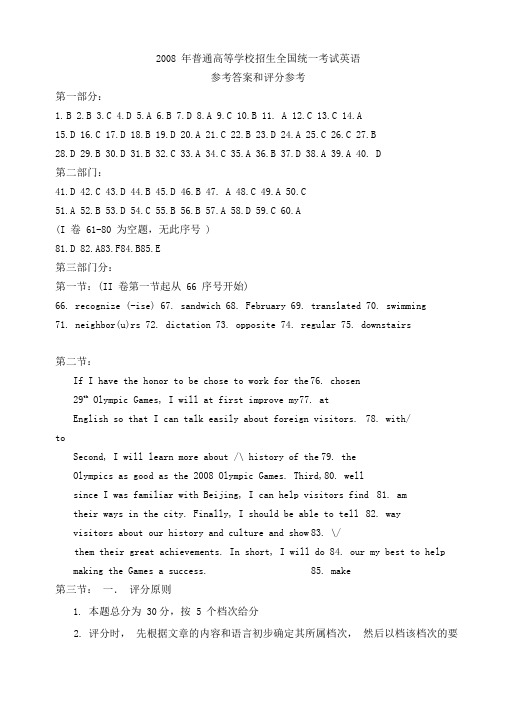
2008 年普通高等学校招生全国统一考试英语参考答案和评分参考第一部分:1.B2.B3.C4.D5.A6.B7.D8.A9.C 10.B 11. A 12.C 13.C 14.A15.D 16.C 17.D 18.B 19.D 20.A 21.C 22.B 23.D 24.A 25.C 26.C 27.B28.D 29.B 30.D 31.B 32.C 33.A 34.C 35.A 36.B 37.D 38.A 39.A 40. D第二部门:41.D 42.C 43.D 44.B 45.D 46.B 47. A 48.C 49.A 50.C51.A 52.B 53.D 54.C 55.B 56.B 57.A 58.D 59.C 60.A(I 卷61-80 为空题,无此序号)81.D 82.A83.F84.B85.E第三部门分:第一节:(II 卷第一节起从66 序号开始)66. recognize (-ise) 67. sandwich 68. February 69. translated 70. swimming71. neighbor(u)rs 72. dictation 73. opposite 74. regular 75. downstairs第二节:If I have the honor to be chose to work for the 76. chosen29th Olympic Games, I will at first improve my 77. atEnglish so that I can talk easily about foreign visitors. 78. with/toSecond, I will learn more about /\ history of the 79. theOlympics as good as the 2008 Olympic Games. Third, 80. wellsince I was familiar with Beijing, I can help visitors find 81. amtheir ways in the city. Finally, I should be able to tell 82. wayvisitors about our history and culture and show 83. \/them their great achievements. In short, I will do 84. our my best to help making the Games a success. 85. make第三节:一.评分原则1.本题总分为30分,按 5 个档次给分2.评分时,先根据文章的内容和语言初步确定其所属档次,然后以档该档次的要求来衡量,确定或调整档次,最后给分。
2008年高考英语试卷听力+原文+答案(全国卷Ⅰ、Ⅱ)

2008年全国统一高考英语试卷(全国卷I)听力试题第一部分听力(共两节,满分30分)做题时,先将答案标在试卷上,录音结束后,你将有两分钟的时间将试卷上的答案转涂到答题卡上.第一节(共5小题,每小题1.5分,满分7.5分)听下面5段对话.每段对话后有一个小题,从题中所给的A、B、C三个选项中选出最佳答案.听完每段对话后,你都有10秒钟的时间来回答有关小题和阅读下一小题.每段对话仅读一遍.例: How much is the shirt?A. £ 19.15.B. £9.18.C. £9.15.答案是C.1. What is the weather like?A. It’s raining.B. It’s cloudy.C. It’s sunny.2. Who will go to China next month?A. Lucy.B. Alice.C. Richard.3. What are the speakers talking about?A. The man’s sister.B. A film.C. An actor.4. Where will the speakers meet?A. In Room 340.B. In Room 314.C. In Room 223.5. Where does the conversation most probably take place?A. In a restaurant.B. In an office.C. At home.第二节(共15小题;每小题1.5分,满分22.5分)听下面5段对话或独白,每段对话或独白后面有几个小题,从题中所给的A、B、C三个选项中选出最佳选项,并标在试卷的相应位置.听每段对话或独白前,你将有时间阅读各小题,每小题5秒钟;听完后,各小题将给出5秒钟的作答时间.每段对话或独白读两遍.听第6段材料,回答第6至8题.6. Why did the woman go to New York?A. To spend some time with the baby.B. To look after her sister.C. To find a new job.7. How old was the baby when the woman left New York?A. Two months.B. Five months.C. Seven months.8. What did the woman like doing most with the baby?A. Holding him.B. Playing with him.C. Feeding him.听第7段材料,回答第9至11题.9. What are the speakers talking about?A. A way to improve air quality.B. A problem with traffic rules.C. A suggestion for city planning.10. What does the man suggest?A. Limiting the use of cars.B. Encouraging people to walk.C. Warning drivers of air pollution.11. What does the woman think about the man’s idea?A. It’s interesting.B. It’s worth trying.C. It’s imprac tical.听第8段材料,回答第12至14小题.12. How long will the man probably stay in New Zealand?A. One week.B. Two weeks.C. Three weeks.13. What advice does the woman give to the man?A. Go to New Zealand after Christmas.B. Book his flight as soon as possible.C. Save more money for his trip.14. What can we learn about flights to New Zealand at Christmas time?A. They require early booking.B. They can be twice as expensive.C. They are on special offer.听第9段材料,回答第15至17题.15. Why did Jane call Mike?A. To ask him to meet her.B. To tell him about Tom.C. To borrow his car.16. Where will Jane be in about one hour?A. At Mike’s place.B. At the airport.C. At a garage.17. What can we infer from the conversation?A Jane has just learned to drive.B. Jane’s car is in bad condition.C. Mike will go to the airport.听第10段材料,回答第18至20题.18. What did the speaker ask the students to do the week before?A. Write a short story.B. Prepare for the lesson.C. Learn more about the writer.19. Why does the speaker ask the questions?A. To check the students’ understanding of the story.B. To draw the students’ attention to reading skills.C. To let the students discuss father-son relationships.20. What will the students do in 10 minutes?A. Ask more questions.B. Discuss in groups.C. Give their answers.2008年全国统一高考英语试卷(全国卷I)听力试题答案及原文【参考答案】1. B2. A3. C4. A5. B6. A7. C8. C9. A 10. A11. C 12. C 13. B 14. B 15. C16. A 17. B 18. B 19. A 20. C听力原文第一节(共5小题,每小题1.5分,满分7.5分)听下面5段对话.每段对话后有一个小题,从题中所给的A、B、C三个选项中选出最佳答案.听完每段对话后,你都有10秒钟的时间来回答有关小题和阅读下一小题.每段对话仅读一遍.Text 1M: I think it’s going to rain.W: I guess so. The skies are dark and cloudy.Text 2M: Lucy is going back to China next month, Alice.W: Oh, really?M: And she will not meet Richer this time.Text 3W: I hate to say it. But Jacky isn’t doing well in the film.M: Well. I think he’s only playing a different type of role. My sister thinks he is still the best.Text 4M: Professor Miners, could I talk to you about my paper?W: Sure. Come to my office between two to three. It’s Room 340.Text 5W: OK. Time to go home.M: I can’t. I haven’t finished the report about the newly opened restaurant.W: Well. If you carry on working like that, you’ll make you rself ill.第二节(共15小题;每小题1.5分,满分22.5分)听下面5段对话或独白,每段对话或独白后面有几个小题,从题中所给的A、B、C三个选项中选出最佳选项,并标在试卷的相应位置.听每段对话或独白前,你将有时间阅读各小题,每小题5秒钟;听完后,各小题将给出5秒钟的作答时间.每段对话或独白读两遍.Text 6M: I haven’t seen you for a long time. Where have you been?W: I went to New York to visit my sister and stayed there for two months. Actually, I really went to meet my new nephew.M: That’s great! How old is he?W: Well. He was five months old when I got there. And he could possibly be the most beautiful baby I have ever seen.M: What did you do in your sister’s home?W: I helped the baby and played with him a lot, which was nice. But what I enjoyed most was feeding him.Text 7M: Air pollution is so bad in this city. I think the government should stop people from driving cars on certain days.W: You have a point. Air pollution is a problem. But not letting people drive on certain days is a bad idea. People have to go to work by car.M: I’m afraid I don’t agree with you there. Reducing air pollution is really important. People are so used to d riving that they don’t think about ways to do things. If we stop them from driving on certain days, maybe they could think of new ways to get around.W: I see your point. But I still think it wouldn’t be possible to stop people from driving.Text 8M: Let’s go and have lunch together.W: OK!M: By the way, I’m thinking of going to New Zealand around Christmas for three weeks. It’s such a beautiful country. I’ve never been there before.W: Have you booked the flight?M: Not yet. I’m planning to book my flight in two weeks’ timeW: Book your flight right now.M: Why?W: Because the longer you leave it, the more expensive it will be. As a matter of fact, the prices may double at Christmas time. New Zealanders usually go home for Christmas.M: Then I’m going to book my flight tomorrow morning.Text 9M: Hello!W: Hello, Mike! This is Jane.M: Oh. Hello, Jane!W: Listen, Mike! I’ve got a real problem.M: What is it?W: The car’s broken down.M: Oh, not again.W: Yeah. I checked the oil and I checked almost every thing. It’s just not starting at all.M: You have to get rid of it, you know.W:I know ,Iknow. But look, the thing is, I’ve got to pick Tom up at the airport. Can I……?M: Use my car? Yes, of course.W: That’ll be great! It’s very kind of you.M: Come on wh en you like. I don’t need it till tonight.W: OK! I’ll be around in about an hour. Thanks a lot!M: It’s all right. See you then!W: See you!Text 10W: OK! When we met last week, we talked about different kinds of short stories and some well-known short story writers. I remember that many of you said you liked the American writer Earnest Hemingway, right? I hope you all followed my advice and finished reading his story “A day’s wait”, because as I said, we’re going to study it together in today’s lesson. Now since you’re supposed to have read this story, let’s have some discussion. Please look at the four questions on the blackboard. First, when and where does the story take place? Second, what does the boy read for in the story and what kind of person does he show himself to be? Third, what kind of person is the boy’s father? Four, what is the writer’s main purpose of writing the story? I’d like you to work in groups of four or five and present your answers in ten minutes. Is everything clear?2019高中教师读书心得体会作为教师,在教授知识的提示,也应该利用空暇时刻渐渐品读一些好书,吸收书中的精华。
2008年高考英语试卷(全国卷Ⅰ)(含解析版)
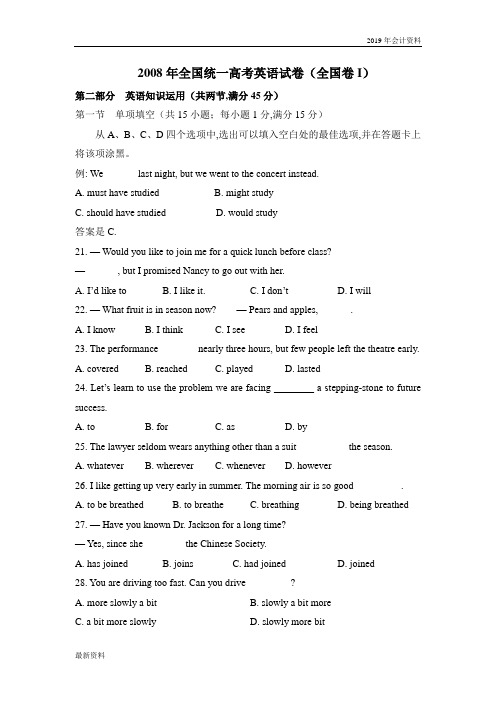
2008年全国统一高考英语试卷(全国卷I)第二部分英语知识运用(共两节,满分45分)第一节单项填空(共15小题;每小题1分,满分15分)从A、B、C、D四个选项中,选出可以填入空白处的最佳选项,并在答题卡上将该项涂黑。
例: We ______ last night, but we went to the concert instead.A. must have studiedB. might studyC. should have studiedD. would study答案是C.21. — Would you like to join me for a quick lunch before class?— ______, but I promised Nancy to go out with her.A. I’d like toB. I like it.C. I don’tD. I will22. — What fruit is in season now? — Pears and apples, ______.A. I knowB. I thinkC. I seeD. I feel23. The performance _______ nearly three hours, but few people left the theatre early.A. coveredB. reachedC. playedD. lasted24. Let’s learn to use the problem we are facing ________ a st epping-stone to future success.A. toB. forC. asD. by25. The lawyer seldom wears anything other than a suit __________the season.A. whateverB. whereverC. wheneverD. however26. I like getting up very early in summer. The morning air is so good _________.A. to be breathedB. to breatheC. breathingD. being breathed27. — Have you known Dr. Jackson for a long time?— Yes, since she________ the Chinese Society.A. has joinedB. joinsC. had joinedD. joined28. You are driving too fast. Can you drive_________?A. more slowly a bitB. slowly a bit moreC. a bit more slowlyD. slowly more bit29. The wet weather will continue tomorrow when a cold front ______ to arrive.A. is expectedB. is expectingC. expectsD. will be expected30. — Which of the two computer games did you prefer?—Actually I didn’t like ______.A. both of themB. either of themC. none of themD. neither of them31. — Have you got any idea for the summer vacation?—I don’t mind where we go ______ there’s sun, sea and beach.A. as ifB. as long asC. now thatD. in order that32. The weather was ______ cold that I didn’t like to leave my room.A. reallyB. suchC. tooD. so33. The English spoken in the United States is only slightly different from ______ spoken in England.A. whichB. whatC. thatD. the one34. After studying in a medical college for five years, Jane ______ her job as a doctor in the countryside.A. set outB. took overC. took upD. set up35. — Sorry, I made a mistake again. —______. Practice more and you’ll succeed.A. Never mindB. Certainly notC. Not at allD. Don’t mention it第二节完形填空(共20小题,每题1.5分,共30分)阅读下面短文,撑握其大意,然后从36—55各题所给的四个选项(A、B、C 和D)中,选出最佳选项,并在答题卡上将该项涂黑。
2016年高考全国I卷英语听力(含听力音频、听力原文和答案)

全国I 卷 英语试题听力英语试题听力 第1页(共6 页)页)绝密★启用前2016年普通高等学校招生全国统一考试全国I 卷 英语听力2016年高考 全国I卷 英语听力音频 双击图标打开收听.mp3(请用电脑,双击上面图标,打开收听)使用地区:安徽、湖北、福建、湖南、山西、河北、江西、广东、河南、山东第一部分 听力(共两节,满分30分)做题时,先将答案标在试卷上。
录音内容结束后,你将有两分钟的时间将试卷上的答案转涂到答题卡上。
上。
第一节第一节 (共5小题;每小题1.5分,满分7.5分)分)听下面5段对话。
每段对话后有一个小题,从题中所给的A 、B 、C 三个选项中选出最佳选项。
听完每段对话后,你都有10秒钟的时间来回答有关小题和阅读下一小题。
每段对话仅读一遍。
秒钟的时间来回答有关小题和阅读下一小题。
每段对话仅读一遍。
例:How much is the shirt?A. £19.15.B. £9.18.C. £9.15. 答案是C 。
1. What are the speakers talking about?A. Having a birthday party.B. Doing some exercise.C. Getting Lydia a gift. 2. What is the woman going to do? A. Help the man.B. Take a bus.C. Get a camera. 3. What does the woman suggest the man do?A. Tell Kate to stop.B. Call Kate’ s friends.C. Stay away from Kate. 4. Where does the conversation probably take place? A. In a wine shop.B. In a supermarket.C. In a restaurant. 5. What does the woman mean? A. Keep the window closed.B. Go out for fresh air.C. Turn on the fan. 第二节第二节 (共15小题;每小题1.5分,满分22.5分)分)听下面5段对话或独白。
2014年全国统一高考英语试卷听力+原文+答案(新课标Ⅰ、Ⅱ)
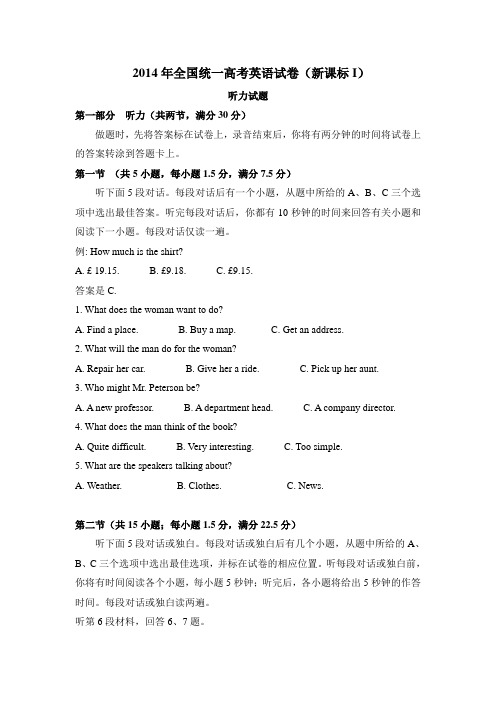
2014年全国统一高考英语试卷(新课标I)听力试题第一部分听力(共两节,满分30分)做题时,先将答案标在试卷上,录音结束后,你将有两分钟的时间将试卷上的答案转涂到答题卡上。
第一节(共5小题,每小题1.5分,满分7.5分)听下面5段对话。
每段对话后有一个小题,从题中所给的A、B、C三个选项中选出最佳答案。
听完每段对话后,你都有10秒钟的时间来回答有关小题和阅读下一小题。
每段对话仅读一遍。
例: How much is the shirt?A. £ 19.15.B. £9.18.C. £9.15.答案是C.1. What does the woman want to do?A. Find a place.B. Buy a map.C. Get an address.2. What will the man do for the woman?A. Repair her car.B. Give her a ride.C. Pick up her aunt.3. Who might Mr. Peterson be?A. A new professor.B. A department head.C. A company director.4. What does the man think of the book?A. Quite difficult.B. Very interesting.C. Too simple.5. What are the speakers talking about?A. Weather.B. Clothes.C. News.第二节(共15小题;每小题1.5分,满分22.5分)听下面5段对话或独白。
每段对话或独白后有几个小题,从题中所给的A、B、C三个选项中选出最佳选项,并标在试卷的相应位置。
听每段对话或独白前,你将有时间阅读各个小题,每小题5秒钟;听完后,各小题将给出5秒钟的作答时间。
2024年新高考全国Ⅱ卷 英语试卷 (含答案和听力)

2024年普通高等学校招生全国统一考试英语(Ⅱ卷)第一部分听力(共两节,满分30分)做题时,先将答案标在试卷上。
录音内容结束后,你将有两分钟的时间将试卷上的答案转涂到答题卡上。
2024年高考英语听力音频(双击打开).mp3第一节(共5小题;每小题1.5分,满分7.5分)听下面5段对话。
每段对话后有一个小题,从题中所给的A、B、C三个选项中选出最佳选项,并标在试卷的相应位置。
听完每段对话后,你都有10秒钟的时间来回答有关小题和阅读下一小题。
每段对话仅读一遍。
例:How much is the shirt?A. £19.15.B. £ 9.18.C. £ 9.15.答案是C.1.What is Kate doing?A. Boarding a flight.B. Arranging a trip.C. Seeing a friend off.2.What are the speakers talking about?A. A pop star.B. An old song.C. A radio program.3.What will the speakers do today?A. Go to an art show.B. Meet the man's aunt.C. Eat out with Mark.4.What does the man want to do?A. Cancel an order.B. Ask for a receipt.C. Reschedule a delivery.5.When will the next train to Bedford leave?A. At 9:45.B. At 10: 15.C. At 11:00.第二节(共15小题;每小题1.5分,满分22.5分)听下面5段对话或独白。
每段对话或独白后有几个小题,从题中所给的A、B、C三个选项中选出最佳选项,并标在试卷的相应位置。
2016-2018三年 高考英语全国I卷听力原文 参考答案 与解析(原创)
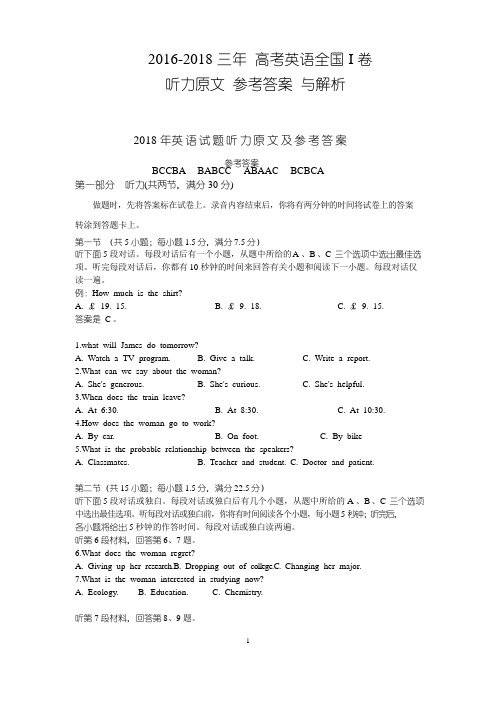
2016-2018三年高考英语全国I卷听力原文参考答案与解析2018年英语试题听力原文及参考答案参考答案BCCBA BABCC ABAAC BCBCA第一部分听力(共两节,满分30分)做题时,先将答案标在试卷上。
录音内容结束后,你将有两分钟的时间将试卷上的答案转涂到答题卡上。
第一节(共5小题;每小题1.5分,满分7.5分)听下面5段对话。
每段对话后有一个小题,从题中所给的A、B、C三个选项中选出最佳选项。
听完每段对话后,你都有10秒钟的时间来回答有关小题和阅读下一小题。
每段对话仅读一遍。
例:How much is the shirt?A.£19.15.B.£9.18.C.£9.15.答案是C。
1.what will James do tomorrow?A.Watch a TV program.B.Give a talk.C.Write a report.2.What can we say about the woman?A.She's generous.B.She's curious.C.She's helpful.3.When does the train leave?A.At6:30.B.At8:30.C.At10:30.4.How does the woman go to work?A.By car.B.On foot.C.By bike5.What is the probable relationship between the speakers?A.Classmates.B.Teacher and student.C.Doctor and patient.第二节(共15小题;每小题1.5分,满分22.5分)听下面5段对话或独白。
每段对话或独白后有几个小题,从题中所给的A、B、C三个选项中选出最佳选项。
听每段对话或独白前,你将有时间阅读各个小题,每小题5秒钟;听完后,各小题将给出5秒钟的作答时间。
- 1、下载文档前请自行甄别文档内容的完整性,平台不提供额外的编辑、内容补充、找答案等附加服务。
- 2、"仅部分预览"的文档,不可在线预览部分如存在完整性等问题,可反馈申请退款(可完整预览的文档不适用该条件!)。
- 3、如文档侵犯您的权益,请联系客服反馈,我们会尽快为您处理(人工客服工作时间:9:00-18:30)。
2008年全国统一高考英语试卷(全国卷I)听力试题第一部分听力(共两节,满分30分)做题时,先将答案标在试卷上,录音结束后,你将有两分钟的时间将试卷上的答案转涂到答题卡上。
第一节(共5小题,每小题1.5分,满分7.5分)听下面5段对话。
每段对话后有一个小题,从题中所给的A、B、C三个选项中选出最佳答案。
听完每段对话后,你都有10秒钟的时间来回答有关小题和阅读下一小题。
每段对话仅读一遍。
例: How much is the shirt?A. £ 19.15.B. £9.18.C. £9.15.答案是C.1. What is the weather like?A. It’s raining.B. It’s cloudy.C. It’s sunny.2. Who will go to China next month?A. Lucy.B. Alice.C. Richard.3. What are the speakers talking about?A. The man’s sister.B. A film.C. An actor.4. Where will the speakers meet?A. In Room 340.B. In Room 314.C. In Room 223.5. Where does the conversation most probably take place?A. In a restaurant.B. In an office.C. At home.第二节(共15小题;每小题1.5分,满分22.5分)听下面5段对话或独白,每段对话或独白后面有几个小题,从题中所给的A、B、C三个选项中选出最佳选项,并标在试卷的相应位置。
听每段对话或独白前,你将有时间阅读各小题,每小题5秒钟;听完后,各小题将给出5秒钟的作答时间。
每段对话或独白读两遍。
听第6段材料,回答第6至8题。
6. Why did the woman go to New York?A. To spend some time with the baby.B. To look after her sister.C. To find a new job.7. How old was the baby when the woman left New York?A. Two months.B. Five months.C. Seven months.8. What did the woman like doing most with the baby?A. Holding him.B. Playing with him.C. Feeding him.听第7段材料,回答第9至11题。
9. What are the speakers talking about?A. A way to improve air quality.B. A problem with traffic rules.C. A suggestion for city planning.10. What does the man suggest?A. Limiting the use of cars.B. Encouraging people to walk.C. Warning drivers of air pollution.11. What does the woman think about the man’s ide a?A. It’s interesting.B. It’s worth trying.C. It’s impractical.听第8段材料,回答第12至14小题。
12. How long will the man probably stay in New Zealand?A. One week.B. Two weeks.C. Three weeks.13. What advice does the woman give to the man?A. Go to New Zealand after Christmas.B. Book his flight as soon as possible.C. Save more money for his trip.14. What can we learn about flights to New Zealand at Christmas time?A. They require early booking.B. They can be twice as expensive.C. They are on special offer.听第9段材料,回答第15至17题。
15. Why did Jane call Mike?A. To ask him to meet her.B. To tell him about Tom.C. To borrow his car.16. Where will Jane be in about one hour?A. At Mike’s place.B. At the airport.C. At a garage.17. What can we infer from the conversation?A Jane has just learned to drive.B. Jane’s car is in bad condition.C. Mike will go to the airport.听第10段材料,回答第18至20题。
18. What did the speaker ask the students to do the week before?A. Write a short story.B. Prepare for the lesson.C. Learn more about the writer.19. Why does the speaker ask the questions?A. To check the students’ understanding of the story.B. To draw the students’ attention to reading skills.C. To let the students discuss father-son relationships.20. What will the students do in 10 minutes?A. Ask more questions.B. Discuss in groups.C. Give their answers.2008年全国统一高考英语试卷(全国卷I)听力试题答案及原文【参考答案】1. B2. A3. C4. A5. B6. A7. C8. C9. A 10. A11. C 12. C 13. B 14. B 15. C16. A 17. B 18. B 19. A 20. C听力原文第一节(共5小题,每小题1.5分,满分7.5分)听下面5段对话。
每段对话后有一个小题,从题中所给的A、B、C三个选项中选出最佳答案。
听完每段对话后,你都有10秒钟的时间来回答有关小题和阅读下一小题。
每段对话仅读一遍。
Text 1M: I think it’s going to rain.W: I guess so. The skies are dark and cloudy.Text 2M: Lucy is going back to China next month, Alice.W: Oh, really?M: And she will not meet Richer this time.Text 3W: I hate to say it. But Jacky isn’t doing well in the film.M: Well. I think he’s only playing a different type of role. My sister thinks he is still the best.Text 4M: Professor Miners, could I talk to you about my paper?W: Sure. Come to my office between two to three. It’s Room 340.Text 5W: OK. Time to go home.M: I can’t. I haven’t finished the report about the newly opened restaurant.W: Well. If you carry on working like that, you’ll make yourself ill.第二节(共15小题;每小题1.5分,满分22.5分)听下面5段对话或独白,每段对话或独白后面有几个小题,从题中所给的A、B、C三个选项中选出最佳选项,并标在试卷的相应位置。
听每段对话或独白前,你将有时间阅读各小题,每小题5秒钟;听完后,各小题将给出5秒钟的作答时间。
每段对话或独白读两遍。
Text 6M: I haven’t seen you for a long time. Where have you been?W: I went to New York to visit my sister and stayed there for two months. Actually, I really went to meet my new nephew.M: That’s great! How old is he?W: Well. He was five months old when I got there. And he could possibly be the most beautiful baby I have ever seen.M: What did you do in your sister’s home?W: I helped the baby and played with him a lot, which was nice. But what I enjoyed most was feeding him.Text 7M: Air pollution is so bad in this city. I think the government should stop people from driving cars on certain days.W: You have a point. Air pollution is a problem. But not letting people drive on certain days is a bad idea. People have to go to work by car.M: I’m afraid I don’t agree with you there. Reducing air pollution is really important. People are so used to driving that they don’t think about ways to do things. If we stop them from driving on certain days, maybe they could think of new ways to get around.W: I see your point. But I still think it wouldn’t be possible to stop people from driving.Text 8M: Let’s go and have lunch together.W: OK!M: By the way, I’m thinking of going to New Zealand around Christmas for th ree weeks. It’s such a beautiful country. I’ve never been there before.W: Have you booked the flight?M: Not yet. I’m planning to book my flight in two weeks’ timeW: Book your flight right now.M: Why?W: Because the longer you leave it, the more expensive it will be. As a matter of fact, the prices may double at Christmas time. New Zealanders usually go home for Christmas.M: Then I’m going to book my flight tomorrow morning.Text 9M: Hello!W: Hello, Mike! This is Jane.M: Oh. Hello, Jane!W: Listen, Mike! I’ve got a real problem.M: What is it?W: The car’s broken down.M: Oh, not again.W: Yeah. I checked the oil and I checked almost everything. It’s just not starting at all.M: You have to get rid of it, you know.W:I know ,Iknow. But look, the thin g is, I’ve got to pick Tom up at the airport. Can I……?M: Use my car? Yes, of course.W: That’ll be great! It’s very kind of you.M: Come on when you like. I don’t need it till tonight.W: OK! I’ll be around in about an hour. Thanks a lot!M: It’s all righ t. See you then!W: See you!Text 10W: OK! When we met last week, we talked about different kinds of short stories and some well-known short story writers. I remember that many of you said you liked the American writer Earnest Hemingway, right? I hope you all followed my advice and finished reading his story “A day’s wait”, because as I said, we’re going to study it together in today’s lesson. Now since you’re supposed to have read this story, let’s have some discussion. Please look at the four questions on the blackboard. First, when and where does the story take place? Second, what does the boy read for in the story and what kind of person does he show himself to be? Third, what kind of person is the boy’s father? Four, what is the writer’s main purpose of writing the story? I’d like you to work in groups of four or five and present your answers in ten minutes. Is everything clear?。
